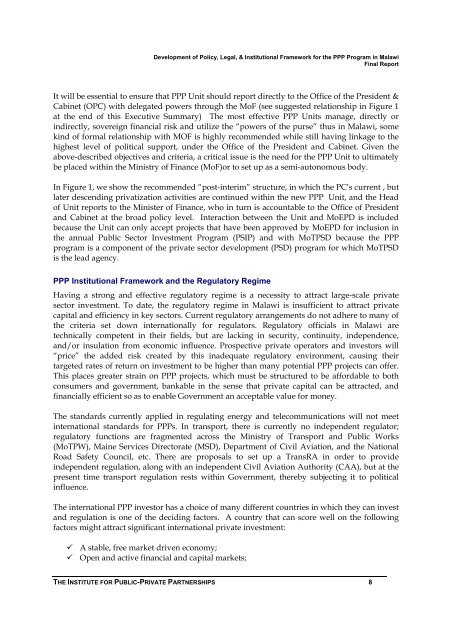Development of Policy, Legal, and Insitutional Framework for - ppiaf
Development of Policy, Legal, and Insitutional Framework for - ppiaf
Development of Policy, Legal, and Insitutional Framework for - ppiaf
Create successful ePaper yourself
Turn your PDF publications into a flip-book with our unique Google optimized e-Paper software.
<strong>Development</strong> <strong>of</strong> <strong>Policy</strong>, <strong>Legal</strong>, & Institutional <strong>Framework</strong> <strong>for</strong> the PPP Program in Malawi<br />
Final Report<br />
It will be essential to ensure that PPP Unit should report directly to the Office <strong>of</strong> the President &<br />
Cabinet (OPC) with delegated powers through the MoF (see suggested relationship in Figure 1<br />
at the end <strong>of</strong> this Executive Summary) The most effective PPP Units manage, directly or<br />
indirectly, sovereign financial risk <strong>and</strong> utilize the “powers <strong>of</strong> the purse” thus in Malawi, some<br />
kind <strong>of</strong> <strong>for</strong>mal relationship with MOF is highly recommended while still having linkage to the<br />
highest level <strong>of</strong> political support, under the Office <strong>of</strong> the President <strong>and</strong> Cabinet. Given the<br />
above-described objectives <strong>and</strong> criteria, a critical issue is the need <strong>for</strong> the PPP Unit to ultimately<br />
be placed within the Ministry <strong>of</strong> Finance (MoF)or to set up as a semi-autonomous body.<br />
In Figure 1, we show the recommended “post-interim” structure, in which the PC’s current , but<br />
later descending privatization activities are continued within the new PPP Unit, <strong>and</strong> the Head<br />
<strong>of</strong> Unit reports to the Minister <strong>of</strong> Finance, who in turn is accountable to the Office <strong>of</strong> President<br />
<strong>and</strong> Cabinet at the broad policy level. Interaction between the Unit <strong>and</strong> MoEPD is included<br />
because the Unit can only accept projects that have been approved by MoEPD <strong>for</strong> inclusion in<br />
the annual Public Sector Investment Program (PSIP) <strong>and</strong> with MoTPSD because the PPP<br />
program is a component <strong>of</strong> the private sector development (PSD) program <strong>for</strong> which MoTPSD<br />
is the lead agency.<br />
PPP Institutional <strong>Framework</strong> <strong>and</strong> the Regulatory Regime<br />
Having a strong <strong>and</strong> effective regulatory regime is a necessity to attract large-scale private<br />
sector investment. To date, the regulatory regime in Malawi is insufficient to attract private<br />
capital <strong>and</strong> efficiency in key sectors. Current regulatory arrangements do not adhere to many <strong>of</strong><br />
the criteria set down internationally <strong>for</strong> regulators. Regulatory <strong>of</strong>ficials in Malawi are<br />
technically competent in their fields, but are lacking in security, continuity, independence,<br />
<strong>and</strong>/or insulation from economic influence. Prospective private operators <strong>and</strong> investors will<br />
“price” the added risk created by this inadequate regulatory environment, causing their<br />
targeted rates <strong>of</strong> return on investment to be higher than many potential PPP projects can <strong>of</strong>fer.<br />
This places greater strain on PPP projects, which must be structured to be af<strong>for</strong>dable to both<br />
consumers <strong>and</strong> government, bankable in the sense that private capital can be attracted, <strong>and</strong><br />
financially efficient so as to enable Government an acceptable value <strong>for</strong> money.<br />
The st<strong>and</strong>ards currently applied in regulating energy <strong>and</strong> telecommunications will not meet<br />
international st<strong>and</strong>ards <strong>for</strong> PPPs. In transport, there is currently no independent regulator;<br />
regulatory functions are fragmented across the Ministry <strong>of</strong> Transport <strong>and</strong> Public Works<br />
(MoTPW), Maine Services Directorate (MSD), Department <strong>of</strong> Civil Aviation, <strong>and</strong> the National<br />
Road Safety Council, etc. There are proposals to set up a TransRA in order to provide<br />
independent regulation, along with an independent Civil Aviation Authority (CAA), but at the<br />
present time transport regulation rests within Government, thereby subjecting it to political<br />
influence.<br />
The international PPP investor has a choice <strong>of</strong> many different countries in which they can invest<br />
<strong>and</strong> regulation is one <strong>of</strong> the deciding factors. A country that can score well on the following<br />
factors might attract significant international private investment:<br />
A stable, free market driven economy;<br />
Open <strong>and</strong> active financial <strong>and</strong> capital markets;<br />
THE INSTITUTE FOR PUBLIC-PRIVATE PARTNERSHIPS 8
















